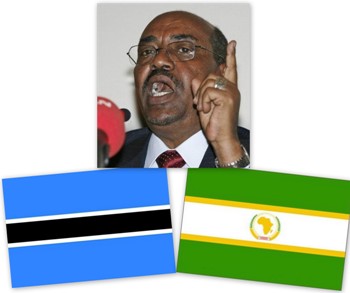Botswana will not abide by AU decision on Sudan’s Bashir: Official
July 5, 2009 (WASHINGTON) — The government of Botswana criticized the decision by the African Union (AU) granting a continent-wide reprieve to the Sudanese president Omer Hassan Al-Bashir from arrest pursuant to the International Criminal Court (ICC) warrant.

The Sudanese foreign minister spokesperson Ali Al-Sadiq said that Bashir is now free to travel to any African country without fear of arrest.
Al-Sadiq further said the decision is binding to all African countries without having to wait for the parliaments to ratify the resolution.
But the Botswanaian foreign minister Phandu Skelemani made surprise statements suggesting that the resolution was forced upon its members.
Skelemani said he tried to make his country’s stance known at the summit and had his hands up for a comment, along with many others, but the chairman of the AU Muammar Gadaffi chose to close the question.
“At the summit it is not everyone who spoke. We had our hands up, but one member moved that the question should be put,” he said to Agence France Presse (AFP).
African diplomats said that the Libyan backed text was agreed to at the foreign ministers level through a vote and at the leadership meeting with a consensus.
“Consensus usually means unanimity, but in this case there was some dissent,” said Benin Foreign Minister Jean-Marie Ehouzou, who said objections by Chad or others would likely be added as caveats to the final summit declaration.
The Botswanaian official said that the position of his government on the issue was clear.
“Before this summit Botswana’s stance was made public. We said we will hand Al-Bashir over to the ICC if ever he came to our shores,” Skelemani said.
The ICC was established specifically to help end impunity for the perpetrators of the most serious crimes of concern to the international community by, for instance, prosecuting those suspected of committing genocide, crime against humanity and war crimes, Skelemani said.
“The people of Africa and Sudan in particular have been victims of these crimes. Botswana strongly holds the view that the people of Africa, including the people of Sudan, deserve to be protected from the perpetrators of such crimes,” he said.
The Rome Statute which forms the basis of the ICC puts legal obligation on the members states for the apprehension of individuals wanted by the court if he arrives in their territories.
This year Botswana and South Africa have publicly announced that they will apprehend the Sudanese head of state if he visits. However Djibouti and Comoros Island announced that they will not honor their obligations under the Rome Statute.
But the Sudanese foreign ministry spokesperson suggested that South Africa’s stance has changed.
“Maybe at one point, the new South African government expressed some negative views … As South Africa was part of the decision at Sirte, it implies that this means he would be able to travel there” Al-Sadiq said.
The legal aspects of the decision at the Sirte summit are unclear. International treaties ratified by a state are binding in whole unless it decides to withdraw from it altogether.
The London based Al-Sharq Al-Awsat quoted the South African president Jacob Zuma as saying that the African stance on the issue did not change against the ICC adding that peace be achieved in Darfur before thinking about reaching a decision on Bashir.
Darfur rebels and human rights organizations condemned the decision saying it grants impunity to a war indicted individual.
In 2004 the UNSC formed a UN commission of inquiry to look into Darfur abuses headed by former President of the International Criminal Tribunal for the Former Yugoslavia (ICTY) Italian Antonio Cassese.
The five-member commission included three African figures from Ghana, South Africa and Egypt.
The commission concluded that the government did not pursue a policy of genocide in the Darfur region but that Khartoum and government-sponsored Arab militias known as the Janjaweed engaged in “widespread and systematic” abuse that may constitute crimes against humanity.
They further said that Sudanese judiciary is “is unable or unwilling” to prosecute those crimes and thus recommended referring the situation to the ICC.
The UNSC issued resolution 1593 under chapter VII in March 2005 referring the situation in Darfur to the ICC. At the time Tanzania and Benin voted in support of the resolution while Algeria abstained.
(ST)
